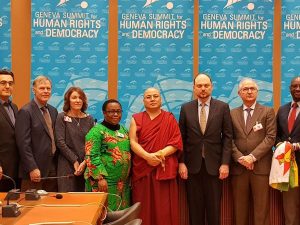
Golog Jigme with other human rights activists
Photo: tibet.net
Tibetans groups and activists have carried out a week of activities to highlight the deteriorating human right for people living in Tibet at the 10th Geneva Summit for Human Rights and Democracy during the week prior to the 37th United Nations Human Rights Council.Representing Tibet at the summit were the Department of Information and International Relations (DIIR) of the Central Tibetan Administration; Tibet Office, Geneva; the Switzerland-based Tibetan Women’s Association and Golog Jigme, the Tibetan human rights activist and documentary film maker.
Golog Jigme, who made documentary film Leaving Fear Behind with Dhondup Wangchen (who escaped Tibet and reunited with his family in United States last month), addressed the Summit on February 20. He spoke of China’s double standards, saying that the difference between what China preaches and what China does in Tibet prompted him to make the film. He wanted to expose the true situation inside Tibet and said that it is “high time”for a consistent and concert effort to safeguard the basic principle of human rights before China jeopardises the “universality of human rights with its economic influence”.
Golog Jigme also gave an account of his mental tortureby the Chinese authorities while he was in detention, saying he was forced to denounce His Holiness the Dalai Lama, the Central Tibetan Administration and the Tibetan Youth Congress and to “admit and declare that 2008 widespread protests in Tibet were a violent act”.
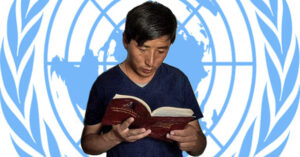
Tibetan language rights advocate Tashi Wangchuk
A group of UN human rights experts issued a public statement on February 21, condemning the Chinese authorities for imprisoning Tashi Wangchuk and calling on them to drop all their allegations against him. Tashi Wangchuk has been in prison for two years following his appearance in a New York Times documentary calling for “linguistic and cultural rights in Tibet”.He had expressed concerns over the “criminalisation of his freedom of expression as well as his right to stand and speak up for what he perceives as human rights violations in his region and country”.
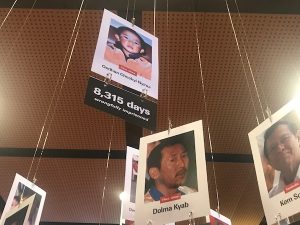
Photo: tibet.net
Six Tibetan political prisoners were among the 35 political prisoners from around the world whose plights were examined at the Summit on February 20. The six were Tibet’s 11th Panchen Lama – Gendun Choekyi Nyima – the world’s longest serving political prisoner; Lobsang Kunchok, a Kirti monastery monk who was given a suspended death sentence for self-immolation; Dolma Kyab, husband of KunchokWangmo who self-immolated; Karma Samdrup – a Tibetan environmentalist sentenced to 15 years; Yeshi Choedon, a retired doctor who was given 15 year sentence and Bonkho Kyi, sentenced to seven years for celebrating His Holiness the Dalai Lama’s 80th birthday.
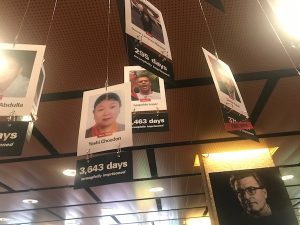
Photo: tibet.net
Other issues raised by Tibetan representatives during the summit werereligious repression in Tibet; the demolition of Larung Gar and Yachen Gar Buddhist acadamies; China’s discriminatory practices of issuing passports; self-immolation protests in Tibet and monitoring and surveillance in Tibetan areas.
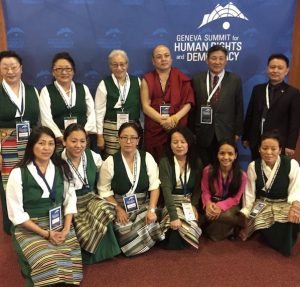
Tibetan representatives
Photo: tibet.net
The Geneva Summit for Human Rights and Democracy is sponsored by a coalition of 25 international human rights non-government organisations, including the Swiss Tibetan Women Association.




 Print
Print Email
Email